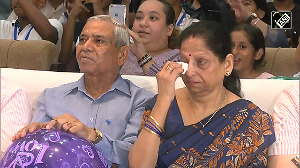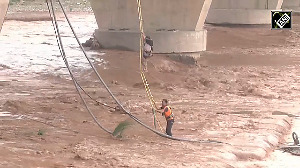With the government of India inclining towards Union Defence Minister A K Antony's adamant stand that the controversial and contentious Armed Forces Special Powers Act should neither be diluted nor withdrawn, the issue was not raised by either Prime Minister Dr Manmohan Singh, Home Minister P Chidambaram, or even Congress chief Sonia Gandhi during Wednesday's all-party meeting on the Kashmir crisis.
The focus was on beginning a dialogue process in Jammu and Kashmir and sending an all-party delegation to the state to assess the situation and recommend further steps to be taken.
There would be another all-party meeting after the return of the delegation from J&K and this would make certain recommendations to the government.
The National Conference was virtually isolated in the meeting with Chief Minister Omar Abdullah choosing to stay away while his father and Union minister Farooq Abdullah did not speak in the meeting.
There was criticism of the chief minister and the government for the manner in which it has been running the state and on issues of governance.
Opposition Peoples Democratic Party chief Mehbooba Mufti, while speaking about the state government's 'limited approach,' went to the extent of saying that, "On one hand the state government arrests hardline Hurriyat leader Syed Ali Shah Geelani for show, and on the other it touches his feet to save them from the separatists."
Chidambaram would lead the all-party delegation, and he would decide the date after consulting all the parties. It is only after the delegation returns from the state, that the next course of action would be decided, and for the moment it is unlikely that the Cabinet Committee on Security would meet, as is being announced by sections of the media.
The decision by the government not to put the proposal of withdrawal
of the AFSPA before the assembled political parties came after Antony made it clear in both the core committee meeting and the CCS that the armed forces were vehemently against the proposal, and that he was supporting their stand.
While both Antony and Finance Minister Pranab Mukherjee did not speak during the meeting, Chidambaram did not even mention the withdrawal of the forces in the brief note he had prepared.
The issue was raised by the Bharatiya Janata Party leaders who were strongly opposed to the withdrawal move and made it clear there should be no further autonomy for J&K.
But BJP did not demand the sacking of Omar Abdullah in the meeting. It is only a demand being articulated before the media by their spokesman.
Even the Left parties, particularly the Communist Party of India-Marxist, which has earlier issued a strong statement demanding the withdrawal of the AFSPA, did not raise the demand in the all-party meeting.
CPI-M General Secretary Prakash Karat did not demand withdrawal, CPI leader A B Bardhan raised the issue in a round about manner and the Revolutionary Socialist Party member did not do so. Only the
Forward Bloc demanded the withdrawal of the AFSPA.
Interestingly, the RSP member later said he changed his mind after he saw that Prakash Karat also did not raise the demand.
Dr Singh, while speaking said that unless and until violence stops in the Valley, there can be no dialogue and discussion. That was a tough standing view of the situation.
Mehbooba Mufti, however, pressed for the phased withdrawal of the armed forces from certain areas, and she wanted 'unconditional dialogue' to be started.
She also emphasised that the government should stop the crackdown and the young stone pelters, 'who were nothing more than children,' should be released. She said that the separatists should also not forward any conditions. She literally stole the show in the meeting.
The five and a half hour meeting was in the words of one leader, 'like an international conference where every one had a chance to speak and no one interrupted anyone else.'
After over 60 years of turmoil in Jammu and Kashmir, an all-party delegation would head for the state to see for themselves and assess why the youth of the state is angry.
After an eyewitness account, they would meet again, discuss and then submit their recommendations to the government. Till then the stock reply of the government of India would be that all political parties are looking into the issue.
As one leader put it, "The government and the Congress party have very cleverly put the problem of Kashmir on the shoulders of all the parties, for them to assess and come back with a blueprint of the future road ahead in the Valley and for the time being got themselves off the hook."






